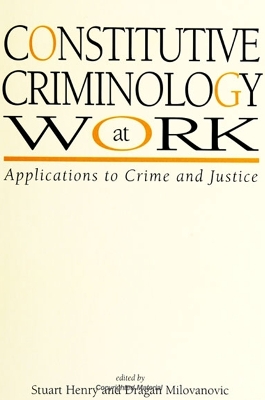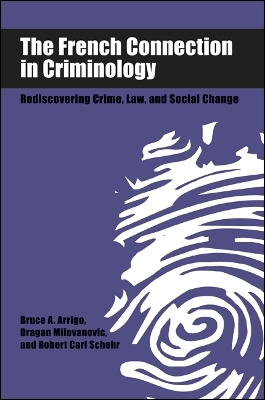SUNY series in New Directions in Crime and Justice Studies
2 total works
Constitutive Criminology at Work reveals the value of applying postmodernist-informed constitutive criminology to issues of crime and justice. A holistic, integrated criminological theory, constitutive criminology takes serious account of the interrelated contributions of human agency and social forces and argues that crime is an integral part of the total material and cultural production of society. Consequently, analysis and control of crime cannot be separated from the wider structural and cultural contexts in which it is produced.
This book argues that constitutive criminology can ultimately help society out of its obsession with the crime and punishment cycle. Based on applications and empirical research within the theoretical framework first presented in the editors' earlier volume, Constitutive Criminology: Beyond Postmodernism, this new book brings together scholars and practitioners who have applied constitutive theory to specific areas of crime and justice practice. It extends development of the constitutive project by drawing together studies that found constitutive theory helpful in understanding distinct problems in the applied world of crime and justice.
[Contributors include Bruce Arrigo, Gregg Barak, Mary Bosworth, John Brigham, Dion Dennis, Victor E. Kappeler, Peter Kraska, Lisa Sanchez, Robert Schehr, Jim Thomas, James Williams, and T. R. Young.]
This book argues that constitutive criminology can ultimately help society out of its obsession with the crime and punishment cycle. Based on applications and empirical research within the theoretical framework first presented in the editors' earlier volume, Constitutive Criminology: Beyond Postmodernism, this new book brings together scholars and practitioners who have applied constitutive theory to specific areas of crime and justice practice. It extends development of the constitutive project by drawing together studies that found constitutive theory helpful in understanding distinct problems in the applied world of crime and justice.
[Contributors include Bruce Arrigo, Gregg Barak, Mary Bosworth, John Brigham, Dion Dennis, Victor E. Kappeler, Peter Kraska, Lisa Sanchez, Robert Schehr, Jim Thomas, James Williams, and T. R. Young.]
The French Connection in Criminology
by Bruce A. Arrigo, Dragan Milovanovic, and Robert Carl Schehr
Published 10 February 2005
Winner of the 2005 Outstanding Book Award presented by the Crime and Juvenile Delinquency Division of the Society for the Study of Social Problems
This is the first comprehensive, accessible, and integrative overview of postmodernism's contribution to law, criminology, and social justice. The book begins by reviewing the major contributions of eleven prominent figures responsible for the development of French postmodern social theory. This "first" wave includes Roland Barthes, Jean Baudrillard, Hélène Cixous, Gilles Deleuze, Jacques Derrida, Michel Foucault, Félix Guattari, Luce Irigaray, Julia Kristeva, Jacques Lacan, and Jean-François Lyotard. Their respective insights are then linked to "second" wave scholars who have appropriated their conceptualizations and applied them to pressing issues in law, crime, and social justice research. Compelling and concrete examples are provided for how affirmative and integrative postmodern inquiry can function meaningfully in the world of criminal justice. Topics explored include confinement law and prison resistance; critical race theory and a jurisprudence of color; media/literary studies and feminism; restorative justice and victim-offender mediation processes; and the emergence of social movements, including innocence projects and intentional communities.
This is the first comprehensive, accessible, and integrative overview of postmodernism's contribution to law, criminology, and social justice. The book begins by reviewing the major contributions of eleven prominent figures responsible for the development of French postmodern social theory. This "first" wave includes Roland Barthes, Jean Baudrillard, Hélène Cixous, Gilles Deleuze, Jacques Derrida, Michel Foucault, Félix Guattari, Luce Irigaray, Julia Kristeva, Jacques Lacan, and Jean-François Lyotard. Their respective insights are then linked to "second" wave scholars who have appropriated their conceptualizations and applied them to pressing issues in law, crime, and social justice research. Compelling and concrete examples are provided for how affirmative and integrative postmodern inquiry can function meaningfully in the world of criminal justice. Topics explored include confinement law and prison resistance; critical race theory and a jurisprudence of color; media/literary studies and feminism; restorative justice and victim-offender mediation processes; and the emergence of social movements, including innocence projects and intentional communities.

